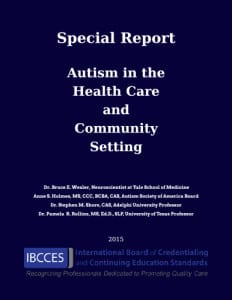An eye-opening report recently commissioned by IBCCES highlights the drastic need for autism related training and certification in health care and community services. The report notes that over $262 billion is spent on Autism related services in the US each year and over 77 percent of primary care physicians, nurses and licensed health care professionals rate their ability to care for someone with Autism as poor or fail.
FOR IMMEDIATE RELEASE
Tuesday, August 11, 2015 Jacksonville, Florida – Leading Researchers and Autism experts from the Yale School of Medicine, University of Texas and Adelphi University teamed up to release a Special Report on Autism in Health Care and Community Services. The report clearly demonstrates that professional training and certification can be the single most important step in showing a commitment to high quality care for people with autism and their caregivers. In addition, the findings show that high quality training and certification will go far to eliminate disparities and improve access to care. “We believe highly trained professionals will help destigmatize the autism spectrum disorder label,” Dr. Bruce Wexler MD, Neurologist and Professor at Yale School of Medicine, said. “Once that is achieved we can focus on helping individuals with autism have more meaningful and satisfactory lives.”
The report also highlights the fact that training and certification will go far to eliminate disparities and improve access to care. Considering medical liability, the growing market of people seeking providers who understand autism and many providers discomfort with the topic, healthcare leaders are confronted with a powerful argument to get their entire staff trained and certified.
Autism is the fastest-growing developmental disorder in the country. About 1 in 68 U.S. children eight years of age have autism, according to The Centers for Disease Control and Prevention. Roughly two million Americans carry a diagnosis of Autism Spectrum Disorder (ASD). “While research on causes and cures for autism is vital and will make for a better future, healthcare services for those who live with the disorder are essential today,” Anne S. Holmes MS, CCC, BCBA, CAS and chairperson of the Autism Society’s Panel of Professional Advisors, said. “Among the most pressing concerns is the lack of attention given to the needs of these children once they become adults and continue to require healthcare and specialized services.”
Because children and adults with autism have a higher comorbidity rate of other chronic diseases than the general population, they will spend more time in health clinics and their care givers will spend four to six times more on their medical expenses.
The report also notes that over 77% of primary care physicians, nurses and licensed health care professionals rate their ability to care for someone with Autism as poor or fail. Meanwhile, individuals with autism and their care givers routinely report negative experiences with health related services and the quality of care they receive.
Health care leaders now have the power to create autism-friendly settings and improve the health of that growing population. Professional training and certification is the single most important step in making a commitment to high quality care for individuals with developmental disabilities. It also makes good business sense, boosting the health center’s competitive edge by improving patient safety, reducing legal liability and decreasing stress for providers and patients. “Training is another word for prevention and it can go far to reduce medical liability. Anything to reduce that is good,” Dr. Stephen Shore, best-selling author and an internationally known expert in the field of autism, said. “Thousands of dollars are spent on litigation and that is money that could have been spent on helping kids.”
The Special Report introduces the fact that training health care providers can be the single most important step in showing a commitment to high quality care for people with autism and their caregivers. Specialized training and certification will boost the health facility’s reputation and credibility, which in turn grows the patient count and sets it apart from competitors, a big advantage in a crowded market place. “It’s something we jumped on,” said Jacksonville Speech and Hearing Center President Michael Howland, who hired IBCCES to train and certify his entire workforce, including front office staff. “Because of the growing incidence of autism and the real need that is out there.”
To access the Special Report on Autism in Health Care and Community Services (full version) CLICK HERE

ABOUT IBCCES
IBCCES routinely certifies a wide range of professionals including: Special Education Teachers; Special Education Directors; School Psychologists; Behavior Specialists; School Counselors; Classroom Teachers; Principals; School Nurses; Speech Language Pathologists; Occupational Therapists; Physical Therapists; Nurses; and Psychologists. In addition, they also do certifications for para-professionals, police officers, bus drivers and first responders who interact with individuals with Autism.
For more information be sure to visit and www.ibcces.org or contact IBCCES at [email protected].
AUG